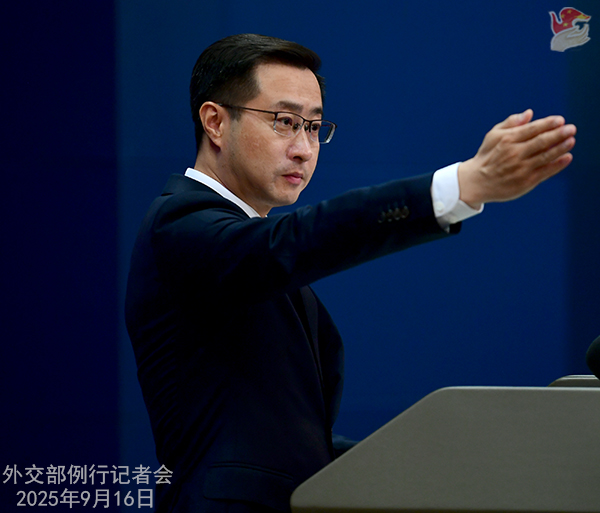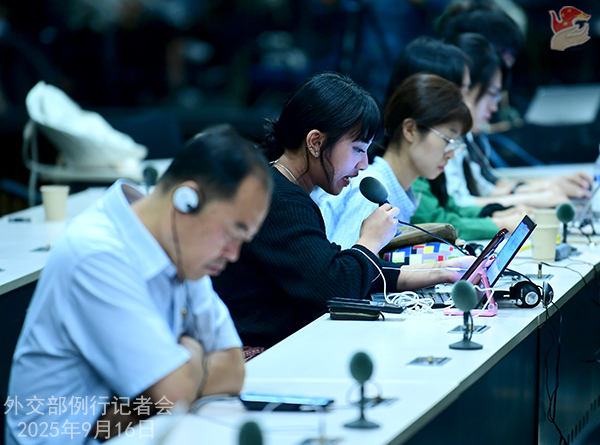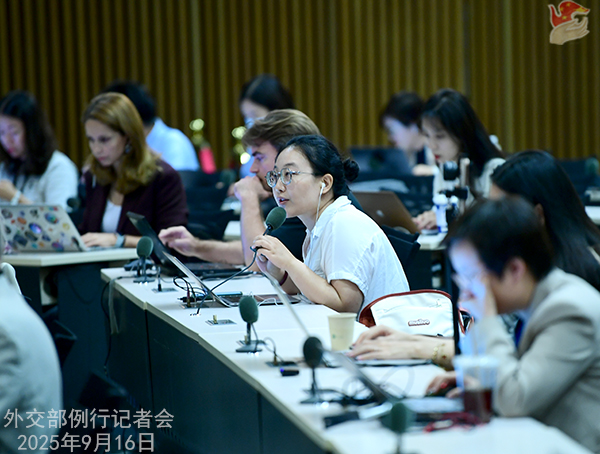
People’s Republic of China


Vice President Han Zheng will attend and address the Opening Ceremony of the 22nd China-ASEAN Expo and China-ASEAN Business and Investment Summit to be held in Nanning, Guangxi on September 17.
Foreign leaders and senior officials, including Prime Minister of Myanmar U Nyo Saw, Vice President of the Lao PDR Bounthong Chitmany, Cambodia’s Deputy Prime Minister and Minister in Charge of the Office of the Council of Ministers Vongsey Vissoth, Malaysia’s Deputy Prime Minister and Minister of Energy Transition and Water Transformation Fadillah Yusof, and Deputy Prime Minister of Viet Nam Mai Van Chinh, as well as Secretary-General of ASEAN Kao Kim Hourn will attend the Opening Ceremony.
CNR: What is China’s expectation for the 22nd China-ASEAN Expo?
Lin Jian: ASEAN is a priority in China’s neighborhood diplomacy and a key region in high-quality Belt and Road cooperation. Under the strategic guidance of leaders of the two sides, China and ASEAN have continuously deepened practical cooperation in various fields and sustained sound momentum in economic and trade exchanges. China has been ASEAN’s largest trading partner since 2009, and the two sides have been each other’s largest trading partners for five consecutive years. Trade between China and ASEAN reached US$686.78 billion from January to August this year, up by 8.6 percent year-on-year. As of July this year, our two-way investment had exceeded US$450 billion. Last May, China and ASEAN completed Version 3.0 China-ASEAN Free Trade Area (FTA) upgrade negotiations. We look forward to signing the protocol within this year.
The China-ASEAN Expo (CAEXPO) is an important platform for deepening China-ASEAN cooperation and advancing regional economic integration. This year’s CAEXPO is themed “Digital Intelligence and Innovation Empower Development — Leveraging China-ASEAN FTA 3.0 New Opportunities for an even Closer China-ASEAN Community with a Shared Future”. China stands ready to work with ASEAN countries to leverage the role of the CAEXPO, take the building of the China-ASEAN FTA 3.0 as an opportunity to further expand trade and mutual investment, unlock the potential of practical cooperation in various fields, build up consensus on upholding multilateralism and free trade, achieve mutually-beneficial cooperation at a higher level, and build an even closer China-ASEAN community with a shared future.
China Daily: We noted that Foreign Minister Wang Yi just concluded his visit to Austria, Slovenia and Poland. Can you share more details about the visit?
Lin Jian: From September 12 to 16, at the invitation of Austria, Slovenia and Poland, Foreign Minister Wang Yi visited the three countries. In Austria, he met with Federal President Alexander Van der Bellen and held talks with Foreign Minister Beate Meinl-Reisinger. In Slovenia, he met with President Nataša Pirc Musar, Prime Minister Robert Golob, and President of the National Council Marko Lotrič, and held talks with Deputy Prime Minister and Minister of Foreign and European Affairs Tanja Fajon. In Poland, Foreign Minister Wang Yi met with President Karol Nawrocki, and held talks and jointly chaired the fourth meeting of the China-Poland Intergovernmental Committee with Deputy Prime Minister and Foreign Minister Radosław Sikorski. The visit achieved good results. It served to consolidate the traditional friendship between China and these European countries, and build consensus on deepening cooperation, promoting development and safeguarding peace.
The visit deepened bilateral relations. Foreign Minister Wang Yi noted that China stands ready to step up strategic communication with the three countries, deepen China-Austria green cooperation, expand China-Slovenia practical cooperation, advance China-Poland cooperation on the Belt and Road Initiative, and strengthen cultural and people-to-people exchange. China and Poland issued the Fourth Meeting of Poland-China Intergovernmental Committee Joint Conclusions. Foreign Minister Wang Yi noted that China and Europe should be friends rather than rivals, and should cooperate rather than confront each other. He expressed the hope that Austria, Slovenia and Poland will play a positive role in fostering an objective and rational understanding on China in the EU, and help advance the sound and steady development of China-EU relations. Leaders of Austria, Slovenia and Poland all noted that they value the relations with China, stand ready to maintain high-level exchanges with China, and stressed that Europe and China are partners and need to enhance constructive dialogue and cooperation. All three countries said they welcome Chinese companies to invest and engage in cooperation in Europe.
Second, the visit promoted the correct view of World War II history. Foreign Minister Wang Yi emphasized that this year marks the 80th anniversary of the victory of the World Anti-Fascist War. The Chinese people paid a huge price and made significant contribution to the victory in the Asian theater of World War II and the World Anti-Fascist War. The outcomes of the victory, including the restoration of Taiwan to China, must be upheld. “Taiwan independence” forces’ attempts to split the country and undermine the post-war international order are doomed to failure. The leaders of Austria, Slovenia, and Poland gave high recognition to the Chinese people’s tremendous sacrifices and outstanding contribution for the WWII victory, and reiterated their firm adherence to the one-China policy.
Third, the visit reflected shared commitment to world peace and promoting global governance reform. Foreign Minister Wang Yi stated that in a turbulent world, China and Europe need to jointly resist and reject unilateralism and power politics. The Global Governance Initiative, put forth by President Xi Jinping, aims at reforming and improving the global governance system and meets the shared aspirations of the international community. China is willing to strengthen solidarity and cooperation with all other countries, firmly uphold the international system with the United Nations at its core, and work together to build a more just and equitable global governance system. The leaders of Austria, Slovenia and Poland spoke highly of China’s development achievements and sense of responsibility as a major country. They welcomed and affirmed the importance of China’s Global Governance Initiative, and expressed their willingness to strengthen communication and coordination with China, safeguard the authority of the United Nations, uphold multilateralism, and join hands for world peace and development.

AFP: China’s Coast Guard said that at around 10 am today, a Filipino ship deliberately rammed a Chinese vessel. The Coast Guard said that this was after vessels from the Philippines illegally intruded into China’s territorial waters of Huangyan Dao. Does the Foreign Ministry have any comment on this incident?
Lin Jian: Huangyan Dao is China’s territory. Philippine official vessels’ intrusion into the waters of the island seriously violated China’s sovereignty, rights and interests and jeopardized peace and stability at sea. China took lawful measures to defend its territorial sovereignty and maritime rights and interests, which was completely necessary and justified.
What happened proved once again that the Philippines’ deliberate infringement and provocations at sea are the root cause of the tensions. The Philippines needs to stop these activities at once and must not challenge China’s firm resolve to safeguard our lawful rights and interests.
AFP: U.S. President Donald Trump has said that he will talk to Chinese leader. The U.S. Treasury Secretary Scott Bessent confirmed in Madrid that a framework deal on TikTok had been reached and said that the two heads of state will complete the agreement during the call. Can the Foreign Ministry confirm that a call is taking place between the two leaders and offer any details on the call as well as your expectations for it?
Lin Jian: Heads-of-state diplomacy plays an irreplaceable role in providing strategic guidance for China-U.S. relations. On your specific question, I do not have information to offer at the moment.
Shenzhen TV: The 2025 Legislators Forum for Friendly Exchanges was held on September 14 in Urumqi of Xinjiang Uygur Autonomous Region. The forum issued the Urumqi Declaration. What’s your comment on that?
Lin Jian: The 2025 Legislators Forum for Friendly Exchanges invited over 60 legislators and former legislators from more than 40 countries. Participants had lively discussion on high-quality Belt and Road cooperation, ecological conservation and green development, ethnic unity and common development. “Dialogue with Legislators of EU Countries” and “Global South Legislators Dialogue” were also held at the Forum. The Urumqi Declaration was adopted as a summary of key viewpoints of participants. China welcomes more legislators from around the world to participate in the activities of the Forum, deepen communication and exchanges, increase coordination and collaboration and promote sustainable development.

Dragon TV: It’s reported that on September 11, in order to rescue a Chinese man stranded in the tidal flats, 34-year-old ROK coast guard officer Lee Jae-seok lost his life. Lee gave his life jacket to the 70-year-old Chinese man who had been injured. They swam together to the shore, but Lee was then swept away and went missing before his body was discovered with cardiac arrest. The life of the Chinese man is no longer in danger. What’s China’s comment on that?
Lin Jian: ROK Coast Guard officer Lee Jae-seok gave his life in the line of duty to save a Chinese national. We wish to extend our deepest condolences over his passing and heartfelt sympathies to his family. We would like to pay high tribute to Mr. Lee Jae-seok for his heroic selfless act. Representative of the Chinese embassy in the ROK attended the farewell ceremony for Mr. Lee.
In June this year, a driver named Xiao Bo in China’s Zhangjiajie, Hunan Province gave his life after guarding the safety of more than 10 ROK passengers, which drew appreciation and rememberance from both Chinese and ROK media as well. Between China and the ROK, there are many touching stories like those. They bear witness and add to the warm and friendly sentiments between the two peoples.
Beijing Youth Daily: It’s reported that the Typhon mid-range missile system has been deployed in Japan by the U.S. as part of a joint exercise between the two countries. China has in the past objected to the presence of this system in the region, saying it fuels an arms race. Do you have a comment on the latest deployment?
Lin Jian: In disregard of China’s grave concern, the U.S. and Japan went ahead with the deployment of the Typhon medium-range missile system in Japan under the pretext of joint military exercise. China strongly deplores and firmly opposes the move. The U.S.’s deployment of the Typhon medium-range missile system in Asian countries undermines the legitimate security interests of other countries, fuels the risk of regional arms race and military confrontation and poses a substantial threat to regional strategic security. The U.S. and Japan need to earnestly respect other countries’ security concerns and play a positive role for regional peace and stability, not the other way around. China urges the U.S. and Japan to heed the call from regional countries, correct the wrongful move and pull out the Typhon missile system as soon as possible.
Due to its history of militarist aggression, Japan’s military and security moves always draw close attention from its Asian neighbors and the international community. This year marks the 80th anniversary of the victory of the Chinese People’s War of Resistance Against Japanese Aggression and the World Anti-Fascist War. We urge Japan to take a hard look at its history of aggression, follow the path of peaceful development, and act prudently in military and security areas, instead of assisting villainous acts and further losing the trust of its Asian neighbors and undermining regional peace and stability.



